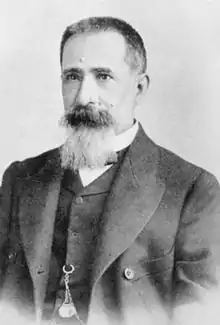Ulisse Dini | |
|---|---|
 | |
| Born | 14 November 1845 |
| Died | 28 October 1918 (aged 72) Pisa, Italy |
| Nationality | Italian |
| Alma mater | Scuola Normale Superiore |
| Scientific career | |
| Fields | Mathematical analysis |
| Doctoral advisor | Enrico Betti |
Ulisse Dini (14 November 1845 – 28 October 1918) was an Italian mathematician and politician, born in Pisa. He is known for his contribution to real analysis, partly collected in his book "Fondamenti per la teorica delle funzioni di variabili reali".[1]
Life and academic career

Dini attended the Scuola Normale Superiore in order to become a teacher. One of his professors was Enrico Betti. In 1865, a scholarship enabled him to visit Paris, where he studied under Charles Hermite as well as Joseph Bertrand, and published several papers. In 1866, he was appointed to the University of Pisa, where he taught algebra and geodesy. In 1871, he succeeded Betti as professor for analysis and geometry. From 1888 until 1890, Dini was rettore[2] of the Pisa University, and of the Scuola Normale Superiore from 1908 until his death in 1918.
He was also active as a politician: in 1871 he was voted into the Pisa city council, and in 1880, he became a member of the Italian parliament.
Honors
He has been elected honorary member of London Mathematical Society.[3]
Work

Research activity
Thus, by the year 1877, or seven years from the time he began, he published the treatise, since famous, entitled Foundations for the Theory of Functions of Real Variables (Fondamenti per la teoria delle funzioni di variabili reali). Much of what Dini here sets forth concerning such topics as continuous and discontinuous functions, the derivative and the conditions for its existence, series, definite integrals, the properties of the incremental ratio, etc., was entirely original with himself and has since come to be regarded everywhere as basal in the real variable theory.
Nell'analisi del XX secolo ha avuto innanzitutto ampio sviluppo la teoria delle funzioni di variabili reali (inaugurata nel 1878 da un libro del Dini) in relazione alle operazioni classiche del calcolo.[4]
Dini worked in the field of mathematical analysis during a time when it was begun to be based on rigorous foundations. In addition to his books, he wrote about sixty papers.[5]
He proved the Dini criterion for the convergence of Fourier series and investigated the potential theory and differential geometry of surfaces, based on work by Eugenio Beltrami.
His work on the theory of real functions was also important in the development of the concept of the measure on a set.[6]

The implicit function theorem is known in Italy as the Dini's theorem.
Teaching activity
One of his students was Luigi Bianchi.
Books by U. Dini
- Serie di Fourier e altre rappresentazioni analitiche delle funzioni di una variabile reale (Pisa, T. Nistri, 1880)
- Lezioni di analisi infinitesimale. vol. 1 (Pisa, T. Nistri, 1907–1915)
- Lezioni di analisi infinitesimale.vol. 2 part 1 (Pisa, T. Nistri, 1907–1915)
- Lezioni di analisi infinitesimale.vol. 2 part 2 (Pisa, T. Nistri, 1907–1915)
- Fondamenti per la teorica delle funzioni di variabili reali (Pisa, T. Nistri, 1878)
See also
Notes
- ↑ See (Ford 1920, p. 174) and (Severi 1957, pp. 23–24).
- ↑ "Rettore" is the Italian title for the chief executive, i.e. the rector, of a university.
- ↑ See the official list of honorary members redacted by Fisher (2012).
- ↑ (English translation) In 20th-century analysis, the theory of function of real variables (inaugurated in 1878 by a book written by Dini), has been widely developed in relation to the classical calculus operations..
- ↑ According to Ford (1920, p. 177).
- ↑ See Letta (1994, pp. 157–161).
References
- Letta, Giorgio (1994) [112°], "Le condizioni di Riemann per l'integrabilità e il loro influsso sulla nascita del concetto di misura" (PDF), Rendiconti della Accademia Nazionale delle Scienze Detta dei XL, Memorie di Matematica e Applicazioni (in Italian), XVIII (1): 143–169, MR 1327463, Zbl 0852.28001, archived from the original (PDF) on 2014-02-28. "Riemann's conditions for integrability and their influence on the birth of the concept of measure" (English translation of title) is an article on the history of measure theory, analyzing deeply and comprehensively every early contribution to the field, starting from Riemann's work and going to the works of Hermann Hankel, Gaston Darboux, Giulio Ascoli, Henry John Stephen Smith, Ulisse Dini, Vito Volterra, Paul David Gustav du Bois-Reymond and Carl Gustav Axel Harnack.
- Severi, Francesco (1957), "La matematica nella prima metà del secolo XX", Scientia: rivista internazionale di sintesi scientifica (in Italian), 92: 20–26. Mathematics in the first half of the 20th century (English translation of the title) is a short survey on the development of mathematics in its various branches during the first half of the 20th century.
Further reading
- Bianchi, Luigi (December 1919), "Ulisse Dini", Annali di Matematica Pura ed Applicata, Serie III (in Italian), 28: V–VI, doi:10.1007/BF02419715, JFM 46.0018.08, S2CID 186242653.
- Fisher, Elizabeth (9 November 2012), Full list of Honorary Members (PDF), London Mathematical Society, retrieved 14 July 2013.
- Ford, Walter B. (January 1920), "A brief account of the life and work of the late professor Ulisse Dini", Bulletin of the American Mathematical Society, 26 (4): 173–177, doi:10.1090/S0002-9904-1920-03281-7, JFM 47.0869.01, MR 1560284.
External links
- O'Connor, John J.; Robertson, Edmund F., "Ulisse Dini", MacTutor History of Mathematics Archive, University of St Andrews
- Ulisse Dini at the Mathematics Genealogy Project